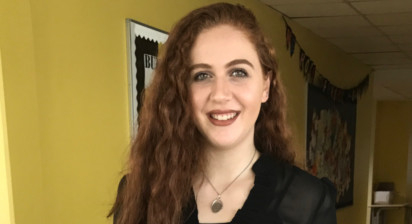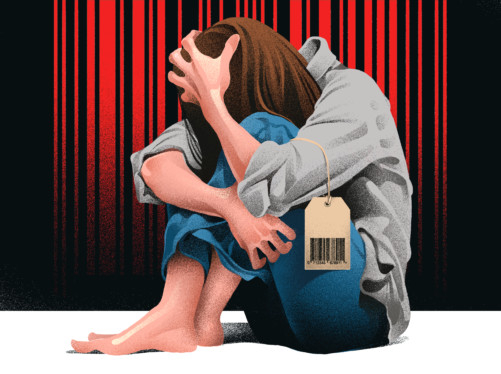
Trap
Such businesses flourish because of corruption
First of all, we should know what is meant by human trafficking. It is actually a kind of slavery, where one only comes to know that he or she is in the situation when they have already sunk into it. The way human traffickers communicate with their potential prey is very scary because they keep changing their face and approach the victims frequently. Victims cannot imagine in their wildest dreams that they will be put in such a vulnerable position. Most of the times, victims sense that something wrong might happen to them but, certainly, they do not realise the extent and gravity of their suffering and what they are heading for.
Now, if you look at the recent Gulf News report, “Fake Indian website offering girls for ‘every taste’ stirs up a storm”, they casually mentioned that they were offering a ‘girl for every taste’ but people still solicited their service. There is surely a lack of awareness among people about the issue of human trafficking, whether they are hiring a domestic help or any other worker. We need to find out where the worker is coming from, because they themselves would not speak out so we, the people, have to do our homework.
In most cases of human trafficking worldwide, it has been observed that such businesses cannot flourish without the knowledge of certain political leaders, bureaucrats and police officers. Whether it is political turmoil, poverty, lack of awareness, basic facilities, education or jobs, they take advantage because of their greed for money and lust. But most of the times, victims also lack social platforms where they can enhance their knowledge as to what is happening around the globe. The International Labor Organisation estimates that this kind of forced labour generates $150 billion in illegal profit per annum. Any law will be a deterrent only if it is implemented and enforced with extreme honesty.
From Mr Mankesh Walia
Motivational speaker based in Dubai
Short-sighted
Illiteracy and the allure of money contribute to the problem
Coming from a developing country, if I look at the issue of human trafficking, there could be many reasons someone falls into the trap — illiteracy, for one. It is a lack of information regarding the rules of the country the person might be working in. Secondly, they only look at the monetary aspect without considering all the ill-effects of that decision. If they are told they can work abroad, most of my countrymen would jump to the conclusion that they want to take the job. Some of my other countrymen, unfortunately, can take advantage of it, whether it is for money or cheap manpower. According to the United Nations, in most cases the victim and the trafficker are from the same background.
As for sex trafficking, on the one hand while women do care about the fact that they might fall into the trap, but they might often not have a choice. As for the demand, many people only care about their own lust and don’t think about the issue.
When it comes to organ donation, the issue is both to do with poverty and desparation. When someone is desperate and poor, they might end up selling their organs and also the people who are receiving the organ might be in a very desparate situation and would not ask if the organ is the result of human trafficking. I think spreading awareness on all platforms is crucial. Now, we have social media and it could be used purposefully, in the right way to influence and inform more peoplem, through which they will be able to educate themselves.
From Mr Nicart Obsuna
Physical education head at a Dubai-based school
Poverty
Most solutions don’t address the root of the problem
Unfortunately, whilst there continues to be a market for sex trafficking, the supply, too, continues. Despite governments attempting to pass laws to reduce legal protection for online sex trafficking platforms, or large companies attempting to raise awareness on the issue by creating a fake, controversial sex trafficking website, the issue persists. We must ask ourselves why. The answer is that this issue is not being resolved at its core. Young girls are lured away from their homes with the promise of a brighter future for them than the ones they foresee, unknowingly being drawn into a ring of trafficking. In their pursuit of income and livelihood, they inadvertently sign up to work in brothels, fields, and homes. The biggest contributor to this issue is the lack of understanding of its context. Living in the bubble that is the UAE such global epidemics often seem distant. We are unaware that it could be happening right under our noses or within our own homes. The greatest difficulty with grasping the magnitude and importance of such crises is the failure to realise that the root of the issue lies in poverty. Poverty spawns numerous problems, including starvation, unemployment, infant mortality, and of course, trafficking. When people find themselves in such helpless situations, they often open themselves up to any potential solution to end their struggles. Seeing as trafficking is a direct result of poverty, people fail to realise that simply passing a bill or trending a hashtag could never completely eradicate the issue. Human trafficking must be stopped at its core and this can only be done through aid and government support, which go directly towards tackling poverty in rural areas. This is wiser as opposed to tackling the legality of various online platforms. Needless to say, although this is an attempt at a solution, it is also a step in the wrong direction. By failing to recognise the issue for what it is - a consequence of impoverishment - we succeed in overlooking its seriousness. Upon understanding this, we can agree that this is not a problem which can be easily impeded or solved.
From Mr Sara Atassi
Pupil living in Dubai
Uncomfortable
We need to shift our focus back to more important issues
I think lack of awareness plays a major role. It is unfortunate but we are very self-centered. Everything is all about, “Does it suit me?”, rather than “What does it mean for the other person?” If the labour is cheaper and makes our lives easier, we don’t think further than that.
But I do think there is a total lack of awareness about this issue. You have awareness campaigns about many other subjects but this is not something people talk about or one can find in the media, to be honest.
Coming from South Africa, I am a little bit more aware about the issue. But that has more to do with sex trafficking. If you went deeper into the issue, I am sure you would find other aspects of human trafficking as well.
But why do we not ask whether the people around might be victims of human trafficking? May be because if we found out about it, we would be quite ashamed as human beings. We keep projecting this image of how good we are and how socity has progressed, while in reality, it goes back generations and generations towards slavery. It is an uncomfortable reality and if we did think about it, surely we would have some compassion and do something about it.
We have created these problems and now we can’t deal with it. We are more concerned about the latest mobile or who’s wearing what on our social media feed. Is this life? Is this important? Even in my own little world, I don’t think about the guy who is cleaning my car and what his life is like or and the guy who is sweeping the road. They are human beings, the same as us, and they deserve the same respect and compassion because at the end of the day we are all trying to live our lives.
It boils down to more awareness and the fact that as a society we need to take responsibility. If governments shared the world’s riches and we were taught compassion as opposed to greed, we might be able to find a solution.
From Ms Kathy Scheepmaker
Marketing and media professional living in Dubai
— Compiled by Huda Tabrez/Community Web Editor
Gulf News asked: Do you think there is enough awareness about the issue of human trafficking?
Yes
No
Have Your Say: Have you ever checked the background of workers you might be hiring? Do you think the issue is misunderstood in society? What do you think can be done to make real, positive progress in eradicating the problem? Share your views with us or participate in future debates. Write to us at readers@gulfnews.com












